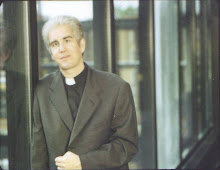I recently reviewed the manuscripts of some of my Advent sermons and the experience left me feeling a bit silly. I discovered that, for more than a quarter century, my Advent preaching reveals an underlying theme, sometimes explicit and sometimes subtle, of convincing people to wait. For example, I once said, after proclaiming the gospel, of course, that our job is to keep watching, to be ready and waiting for God to come to us in Christ and to put an end to the old and begin something new. To drive the point home in the congregations I served, we waited until after the Fourth Sunday of Advent to put up the tree in the sanctuary (I still make faces when a Christmas tree goes up in the lobby of the seminary in mid December) and until Christmas Eve to sing carols. In some sermons, I came across as a parent lovingly insisting that the children wait until Christmas morning to open their presents; more often, the congregations I served responded as if I was Ebenezer Scrooge. Every Advent, someone reminded me that the church has been waiting for two thousand years for Jesus to come suddenly and he hasn’t arrived yet. Most often in worship, we pretended or feigned waiting and it was not very convincing.
So, feeling silly that I cannot convince people to wait, I find myself wondering how my Advent preaching would sound if I consciously preach to people who don’t need convincing. What would my Advent preaching be like if I preach to those who are really, truly, earnestly, and genuinely waiting for God? Who are these people? Perhaps they are still sitting in the ash of last Lent, because their awareness of their sin is so great that, when the church celebrated Christ rising on Easter, they somehow got left behind in the tomb. Jennifer Moland-Kovash, who offers reflections for the Fourth Sunday of Advent, reminds us that “Mary’s pregnancy is not a long-awaited grandchild for her parents; the cries for God’s action are born out of an experience of God’s perceived absence or even punishment.” Perhaps those waiting for God include people convinced that God has abandoned them and are waiting for God to come back. Maybe they are people whose experience of God is penalizing, unforgiving, even vindictive, and they are waiting for the mercy and grace they hear so much about. Jenn continues, “Those who grieve--whether they sit in the pew, stand behind the pulpit or hover just outside the doors--might resonate with the very present sense of longing in these readings.” In addition to those grappling with sin and grief, I am mindful of people who understand themselves as gifted by the Spirit, called to participate in the priesthood of all believers, but are unable to find employment, and so have given up hope of exercising any sense of vocation. We all know people waiting for God to grant them justice, forgiveness, wholeness, and peace.
How do we preach Advent to these people? I do not imagine that preaching to those who genuinely wait for God will change the core message of Advent preaching. I won’t, for example, offer a sermon series on getting through the holidays after a loved one has died. This is important pastoral care that, in my opinion, works best in a venue other than the pulpit. Besides, I think we need to be reminded that we know the end of the story, the world’s as well as our own. “Christ will,” as we pray at the table, “come again in beauty and power to share with us the great and promised feast.” Rather than changing sermon content, I want to include people who are truly waiting for God as my conversation partners in sermon preparation to give the content urgency, immediacy, authenticity, and realism. To do this, I could imagine devoting my November newsletter article (a task I am so very glad usually is handled by my pastoral colleague) to inviting those who are genuinely waiting for God to invite me to coffee and tell me their story. I’d open the readings and I would ask them what they think, what questions they have, what feelings get evoked, what they need to hear. I suspect that these conversations would infuse my sermons–and through them the congregation–with an authentic Advent spirit, which I previously thought I had to cultivate by convincing.
I pray that we who earnestly and genuinely wait for God will experience Christ’s coming in and through the Church’s preaching this Advent. God grant that our sermons will be experiences of forgiveness, comfort, hope, purpose, justice, and peace. “Stir up your power, Lord Christ, and come.”
Wednesday, August 12, 2009
Subscribe to:
Post Comments (Atom)

No comments:
Post a Comment